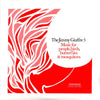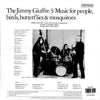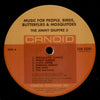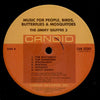







The Jimmy Giuffre 3 - Music for People, Birds, Butterflies & Mosquitoes
Tenor Saxophone, Flute, Clarinet - Jimmy Giuffre [click here to see more vinyl featuring Jimmy Giuffre]
Percussion – Randy Kaye
Bass – Kiyoshi Tokunaga
Written by Jimmy Giuffre
1 LP, standard sleeve
Original analog Master tape : YES
Heavy Press : 180g
Record color : black
Speed : 33 RPM
Size : 12'’
Stereo
Studio
Record Press : unspecified
Label : Candid
Original Label : Choice
Recorded December 1972 at Macdonald Studio, Sea Cliff, New York
Engineered and produced by Gerry Macdonald
Remastered by Alex McCollough at True East Mastering
Lacquer cut by Jeff Powell at Take Out Vinyl
Painting by Juanita Giuffre
Photography by Ray Ross
Reissued in December 2023
Tracks :
Side A:
- Mosquito Dance
- Night Dance
- Flute Song
- Eternal Chant
- The Bird
- The Waiting
Side B:
- The Butterfly
- The Chanting
- Moonlight
- Dervish
- Phoenix
- Feast Dance
Reviews :
“In 1973, the American jazz multi-instrumentalist Jimmy Giuffre (1921-2008) released Music For People, Birds, Butterflies & Mosquitoes, an Eastern-inspired trio album featuring the percussion of Randy Kaye and Kiyoshi Tokunaga on bass. Whilst being his first studio release in ten years, Giuffre was no stranger to committing his progressive and free-flowing musical ideas to record (with a recording history of nearly two decades already behind him). But, thanks to an extensive career of touring and recording under the guise of his trio – the ‘Jimmy Giuffre Three’ – throughout the late fifties and early sixties, the woodwindist had risen to the ranks of an artist known for pushing the boundaries of his craft.
The music displayed on the 1973 release is light and sparse – some might describe it as delicate, even. Giuffre had been at the forefront of experimentalism in jazz, something conveyed both through his fluid interplay with his fellow musicians and his decision to abandon the conventional role of a drummer. The result of this had formulated into a type of 'jazz with a non-pulsating beat' as the musician described in the liner notes of his album, Tangents of Jazz (1956). Having departed from his beginnings in bop, the musician’s first band under his own name consisted of guitarist Jim Hall and double bassist Ralph Peña, and was known for its loose and creative brand of ‘blues-based folk jazz’. This group would undergo several formations of the next few years, with the arrival of musicians such as trombonist Bob Brookmeyer each making their contribution to Giuffre’s signature conceptual style, before landing on the solidified lineup of pianist Paul Bley and bassist Steve Swallow from 1961. The leader began to focus on his clarinet-playing as well as pursuing the more avant-garde leanings of his subtle compositions.
There was something about this ensemble which had previously been unmatched in mainstream jazz. Anticipating the free jazz explosion that was yet to come, this iteration of the Giuffre trio applied a contrarian philosophy against the wider frame of popular music. Rather than adopting the sabre-rattling sonic extremities of John Coltrane, Ornette Coleman or Albert Ayler, this period saw the ensemble quietly rebel against years of formalism, opting instead for a more hushed form of ‘chamber jazz’ – something that was almost better suited to the concert hall stage than the hustle and bustle of inner-city clubs. So radical was the uninhibited creative expression of this outfit that audiences at the time didn’t quite know what to make of it. As fate would have it, the ensemble was to fizzle out following this landmark year of music-making – many recordings of which, luckily for contemporary audiences, have circulated their way into the wider market for us to experience for the first time.
Music For People, Birds, Butterflies & Mosquitoes marks a return to form for the freewheeling innovator. With a newly minted ensemble, his compositions and performance style was infused by this point with many transconinental traits which had developed in jazz over the course of the prevailing years. Its seamless transition of tracks creates a carefully-considered brevity unthought of in most musical regions prior. Weightless and free, this record is a truly telling example of the kinds of foundations musicians can achieve when they set their minds to alternative philosophies, unafraid to go against the grain in pursuit of something more daring.” Presto Music Review by Barney Whittaker
Ratings :
AllMusic : 2 / 5 ; Discogs : 4.57 / 5






